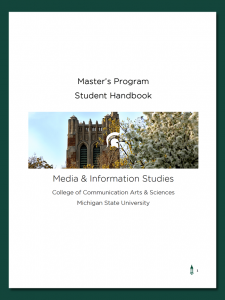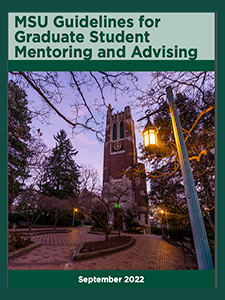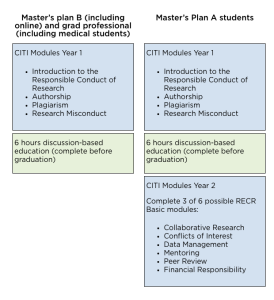Media + Information
Required Forms and Procedures
Resources for Students
This page has resources for the graduate students in the Media & Information Department. It includes proceedures and forms you will need to complete your degree successfully. All guidelines are subject to the by-laws of the Media & Information department. Please contact the MA director Ruth Shillair, or our APC Jessica Fischer if you have any questions.
The Basics
Academic Handbook
Plan of Study
This is a customized plan that helps you to complete all the basic requirements to complete their degree. Click here or on the image below to download the latest Plan of Study Form.
Planning your classes, research integrity, advising and mentoring
Making your Plan of Study
Our program is flexible and will support you in getting training to develop skills needed for our domains of expertise. Please see our recommended tracks and class choices. Be aware that not all classes are offered every semester. Some classes are primarily in the fall or spring. Please refer to the following presentation to guide you in selecting classes. You might want to take classes that aren’t specifically on your track to be able to work with a specific professor. Please review the recommended classes before meeting with your advisor. New opportunities often are offered from guest scholars or faculty research teams. We update our students on these opportunities. Work with your advisor and the MA director to fine tune your plan of study.
MI MA Recommended Classes by Focus Area
Taking MI 400 level classes
Some classes, especially MI400 level, are useful for graduate students. To enroll you will need an override request through the CAS college. First talk to your advisor or the director if the class will be appropriate. Prerequisite classes are usually waivered, but there are exceptions.To apply for a waiver to take a MI400 level class, have your browser logged into your MSU identity and go to CAS Override > New Request . Be aware that if the class is full you will be placed on a waiting list, and that the faculty teaching the class must also approve the waiver.
Independent Study
Sometimes you may want to work deeply on a special topic, or want to work closely with a specific professor. Students should talk to the MA director to find out options. Then the student can reach out to the professor to see if this is an option. Enrollment is through our APC (academic program coordinator Jessica Leadbetter. Fill our the form and contact her. Download the form here.
Research Integrity and Mentoring: Details
All graduate students required to take RCER training credits. Students who do not fulfill their RCER training will not be able to get a degree conferred and will have to enroll an additional semester for one credit. These classes often fill to capacity so enroll early in the semester for the entire year.
At the beginning of your program all students take the online CITI modules. These are online and don’t take too much time to complete.
Master’s Plan A (thesis) students need 6 additional hours of discussion based training and in their second year an additional 3 hours of training.
Master’s Plan B (project/ poster) students need 6 additional hours of discussion based training.
See the Graduate School Schedule to sign up for the appropriate sessions.
These are tracked through each student’s SIS plan.
Advisors and Mentoring
Students are assigned an initial advisor based on their interests stated on their application and availability of faculty advisors. It is normal, after meeting different faculty, attending classes, and being involved in research teams a student will choose another advisor to help them lead their committee for their final deliverable.
A student will meet with their advisor or their committee chair to evaluate their progress and meet (virtually is fine) with your advisor to discuss your progress and make any needed updates
Plan A students download the form here
Plan B student download the form here
Change of Advisor Form
As you get further in your program you might find that you want to change the advisor you were assigned when you came in to the master’s program. If you contacted your perspective new advisor and they are able to help you, you then use this form to officially change your advisor. Download form here.
Forming your Master’s Committee
The Academic Program Coordinator has to enroll you in project or thesis credits. Please see the section below “Finishing” for details about the process. You should assemble your committee and do your project/thesis proposal defense either before the start semester of your project/thesis or shortly after the start of the semester. You need 4-6 project or thesis credits to complete the degree. If you do a poster (oral examination) you do not take project or thesis credits. Click here for details about selecting your committee members.
Steps to Complete Your-
Thesis/ Project/ Poster
Plan A Thesis
Students doing the Plan A thesis track are often going on to pursue a Ph.D. or work where a detailed example of their skills in research and communication are desirable.
The thesis is a published document that demonstrates high standards of writing as it becomes a public document, available to other researchers and citable. You will work with the steps outlined by the Graduate school to properly format your thesis and submit it for publication through ProQuest.
The steps of a thesis-
1. Talk to your primary advisor about your research idea and narrow it down. Work on a proposal idea. Once you have a proposal developed contact two other professors to make up your committee. A thesis committee requires three authorized members. Submit your proposal to them for review and set up a proposal defense date. There are rules for the composition of your committee. Click here to see a listing of our faculty and their eligible positions on committees.
2. Present (defend) your proposal to your committee. They will provide feedback and guidance on your thesis. Once you finish your defense, have the committee sign the thesis proposal defense form (click here to download).
3. If your research uses individuals, either for surveys or interviews you need to get IRB approval. Talk to your advisor to start this process. Here is a link to a document to guide you in making your IRB document.
4. Once your research is approved, complete your research and finish writing your thesis. Work closely with your advisor and set up a time to defend your thesis.
5. Present (defend) your thesis to your committee. Once your have completed any requested revisions satisfactorily, then your committee will sign your thesis defense (click here to download).
6. Submit your signed thesis defense form to the master’s program director. Submit your approved thesis to the graduate school following the formatting guidelines.
Plan B Project
Students doing a Plan B with with either a project or a poster are often preparing for work in business or industry. The project produces an artifact that is often useful as a portfolio piece for getting a job in industry/ business. Students that already have a job lined up often chose the poster as this provides demonstration of research skills.
The steps for a Plan B project-
1. Talk to your primary advisor about your project idea and discuss the proposal and timeline. Once you have a proposal you can reach out to get one more committee member. The project committee needs two members. Submit your proposal for review to both committee members and set up a proposal defense date. MSU has specific requirements for committee composition- click here to see the document to guide your selection.
2. Present (defend) your project idea to the committee. They will provide feedback and guidance on your thesis. Once you finish your defense, have the committee sign the project proposal defense form (click here to download).
3. If your research uses individuals, either for surveys, interviews, or usability testing, you need to get IRB approval. Talk to your advisor to start this process. Here is a link to a document to guide you in making your IRB document.
4. Once your research is approved, complete your research and finish writing the presentation of your project. Work closely with your advisor and set up a time to defend your project.
5. Present (defend) your project to your committee. The presentation can be via Zoom, Teams, or in person: however, it must be live to allow for questions and feedback. Once your have completed any requested revisions satisfactorily, then your committee will sign your project defense form (click here to download).
6. Submit your signed project defense form and a copy of your project to the master’s program director.
Plan B Poster
(Oral Examination)
Students that already have a job and are getting a master’s for promotion in their field, often chose the poster as this provides demonstration of research skills. This is also appropriate for students who had a rich internship experience where they want to use the internship research to demonstrate their research and design skills. The student must present their poster to a team of judges and answer questions about their research. The judges meet the last full week of classes each semester. If the student needs more time it is recommended that they do a project as this allows more flexibility in arranging a defense date.
The steps for a Plan B poster
1. Talk to your primary advisor about your poster idea and discuss your timeline. Often students will make posters to demonstrate the original work they did in an internship. The poster is similar to those presented at an academic conference. Once a student and their advisor agree on the poster content fill out and submit the poster proposal form (click here to download).
2. If your research uses individuals, either for surveys, interviews, or usability testing, you need to get IRB approval. Talk to your advisor to start this process. If the research is performed as part of your normal internship activities you will probably not need IRB approval. Talk to the master’s program director if you have questions as each situation is unique. Here is a link to a document to guide you in making your IRB document.
4. Once your research is approved, complete your research and finish making your poster summarizing your work. Work closely with your advisor to make sure it is satisfactory.
6. The last week of classes each semester we set up a time and day where students present their poster. They have about 15 minutes to explain their research and an additional 10-15 minutes to answer questions from the poster judges. The student can present the poster via conference video, but the student must be live to answer questions.
7. Submit your signed poster defense form (click here to download) to the master’s program director.
Support for Research and Conference Presentations
Thesis/ Project/ Poster
Funding
We often have support to assist students to present their research in academic venues, such as conferences. The resources vary by year and are distributed by the Graduate School. We also have limited funding to help with direct research expenses. See the categories below, please contact the director of master’s studies, Dr. Shillair, if you have any questions.
Funding for research projects
We have funding for research projects that contribute towards your capstone master’s project or poster, your thesis, or for research tied to your studies.
Funding requests for research project expenses
When completed send to Jessica Leadbetter and Dr. Shillair.
Funding for emergencies
We have limited funds to help with emergencies- these are defined by the Graduate school-. These funds are not for normal budget shortfalls, but for unexpected major costs (e.g., medical, or family emergency requiring travel) and only available if the funds are available. Contact Jessica Fischer (our APC) or Dr. Ruth Shillair (our director) to start the process. If you submit directly to the graduate school it will be denied and re-routed.
Emergency Expense Funding form
Funding for conference travel and registration
These forms are for both MA and PhD students in our department
Be sure to work with our department’s travel agency and Kim Williams for making travel arrangements. If there are cancellations to conferences travel costs can be refunded to the student IF booked through our travel resources.
If you book them yourself we cannot offer any refunds and your funding is unlikely.
Irregardless of your arrangements, you must register your conference travel with Kim Williams as this impacts travel insurance and emergency support.
Read this 1st for travel funding guidelines
Travel Funding from MI department request
Travel Funding Grad School application
Payback agreement
Council of Graduate Student Funding Opportunities
Scholarships
We have many substantial scholarships funded by our generous alumni. These support outstanding students that are focused on specific goals. Application period is usually January to early February and they are awarded to students for the following year. Students can apply for more than one scholarship. Click here for more details.
Further Support and Resources For Students
MSU has extensive resources for our students. Please click here for our New Student Welcome Packet: Campus Resources for details.

Special Certifications and Tracks
Serious Games Graduate Certificate
This certificate can be taken as a stand alone degree. It can be done entirely online or in the traditional classroom. The program is designed to give game designers, business people, teachers, and researchers graduate-level insight into serious game theories, serious game design, and more-than-human-centered design. Click here for more information-
If you are already an MI graduate student or an MSU graduate student in another program- see details below.
If you are interested in the certificate only and not already an MSU graduate student Click here for more details about the application process-
Deadlines:
June15 for fall semester
November 15 for spring semester
Already an MI graduate student?
Already an MSU graduate student in another department?
UG2G Undergraduate to Graduate Program
This program allows high performing students to share up to 9 credits (usually three classes) between their bachelor’s and master’s degree. Full details are on the registrar’s website.
Shared credits are for MI 400 level classes where students have a grade of 3.0 or above. These only can be shared after the student is accepted into the program, so students need to apply prior to the start of the semester where they want to share credits. Click here for the link to the form to fill out to indicate your interest in the program and share classes. You must fill this out and send to the director (migrad@msu.edu) before you finish your bachelor’s degree. However, if accepted to the program students don’t start their master’s classes until after they have finished their bachelor’s degree.
Students should have a GPA of 3.5 or higher, especially in their area of focus. They will go through the full MA application to be fully in the program.
Contact the director of MI Master’s program for more information-use the contact us form at the bottom of the page.
Graduate Specialization in Media & Information Studies
The graduate specialization is available as an elective to students who are enrolled in master’s or doctoral degree programs at Michigan State University. With the approval of the department and college that administers the student’s degree program, the courses that are used to satisfy the graduate specialization may also be used to satisfy the requirements for the master’s or doctoral degree. This is espeical useful for students wanting a basic overview of media research as it consists of three classes that explore quantitative research, media theory, and qualitative methods at the 900 level.
Contact the director of MI Master’s program for more information- use the form at the bottom of the page.




